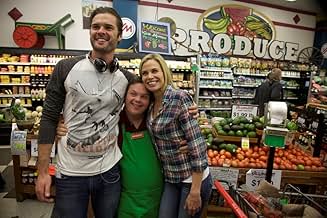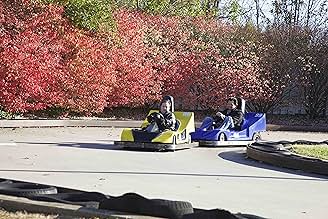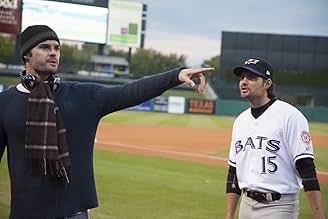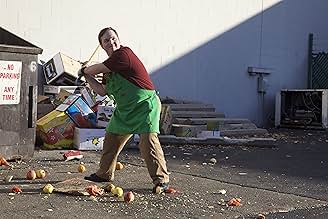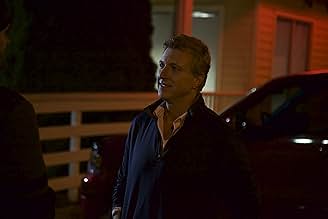IMDb RATING
6.6/10
4.3K
YOUR RATING
A baseball player whose professional career was cut short due to his personal problems is suddenly awakened and invigorated by a young-man with Down syndrome who works at the local grocery s... Read allA baseball player whose professional career was cut short due to his personal problems is suddenly awakened and invigorated by a young-man with Down syndrome who works at the local grocery store.A baseball player whose professional career was cut short due to his personal problems is suddenly awakened and invigorated by a young-man with Down syndrome who works at the local grocery store.
- Awards
- 3 wins & 1 nomination
William Zabka
- Milton
- (as Billy Zabka)
Clyde Risley Jones
- Dexter
- (as Clyde Jones)
Michelle J. Fine
- Nurse Kristen
- (as Michelle Fine)
- Director
- Writer
- All cast & crew
- Production, box office & more at IMDbPro
Storyline
Did you know
- TriviaDavid DeSanctis will become one of the first actors with Down syndrome to play a leading role in an English-language feature film.
- ConnectionsReferences Rain Man (1988)
- SoundtracksLife, Love and Pain
Written by Kyle James Hauser
Performed by Kyle James Hauser
Courtesy of sonaBLAST! Records
Featured review
The history of physically and/or mentally challenged actors isn't a long one, but it is expanding, and it added a significant chapter with the release of "Where Hope Grows" (PG-13, 1:35). That movie co-stars David DeSanctis as a young man with Down syndrome, one of the first major English-language film roles for an actor living with that condition. With this role, DeSanctis has achieved an on-screen prominence that is not unique, but only a few others who live with such serious conditions have reached that level of success in their careers. Chris Burke became a pioneer playing Corky, a boy with Down syndrome, in the TV series "Life Goes On" (1989-1993) and he also appeared in the film "Mona Lisa Smile" (2003). After a horse riding accident in 1995 left him paralyzed, Christopher Reeve, known primarily for his "Superman" films, continued to work in movies and television until his death in 2004. RJ Mitte, who lives with cerebral palsy, played Walter White, Jr. on TV in "Breaking Bad" (2008-2013) and is set to appear in three films to be released over the next two years.
But it's actors with Down syndrome who have made the most significant inroads on behalf of differently-abled actors. Lauren Potter co-starred in the film "Mr. Blue Sky" (2007) and on the TV series "Glee" (2009-2015), while Evan Sneider had the largest film role for someone with his condition in "Girlfriend" (2010) that is, until "Where Hope Grows". As awareness of certain limiting conditions has grown in recent years, the common refrain from those who are mentally and/or physically challenged (and their families, friends and advocates) is that they most want to be treated like everyone else. In that spirit, I'm prepared to review DeSanctis' film with the objectivity that I try to bring to all of my reviews (even though he IS great in it).
DeSanctis plays a grocery store employee who is called "Produce", after the tag he wears on his green apron, indicating the department where he works. Produce always seems to be in a good mood and always treats his store's customers with respect and affection, dispensing encouraging words and hugs as freely as tomatoes. Produce's positivity has the biggest impact on Calvin Campbell (Kristoffer Polaha), a down-on-his luck former baseball player who lives in the neighborhood. But to be fair, luck (or lack thereof) doesn't have much to do with Calvin's problems. He has allowed his unfulfilled potential in the bigs to keep him down for 15 years. He doesn't work and he's an alcoholic who also happens to be a single parent to 17-year-old Katie (McKaley Miller). She loves her father, but can only wish that she could respect him. He constantly disappoints her, caring more about spending time with his drinking buddies, Milton (William Zabka) and Mitch (Kerr Smith) than with her.
Calvin's drinking is at the core of most of the conflicts within this movie. His neglect of his daughter leaves her free to be in an unhealthy relationship with the somewhat older and practically amoral Colt (Michael Grant) and dad has no moral high ground to stand on when he objects to his daughter hanging out with Colt. Calvin also drinks and drives with regularity, endangering other drivers, himself and those who are unlucky or unwise enough to be riding with him. His self-destructive tendencies also jeopardize his possible future personal and professional relationships, like when he gets an opportunity to interview to be the next manager of a local minor league baseball team, or when he meets a kind and good-looking woman (Brooke Burns) in the grocery store. Produce is anxious to be Calvin's friend and help Calvin see his personal problems differently, but even the sweet and growing friendship between Produce and Calvin seems unlikely to bear fruit, if Calvin can't manage to put down the bottle.
In spite of all his issues, Calvin's friendship with Produce seems like his best shot at redemption. Obviously needing some of Produce's upbeat, can-do attitude, Calvin asks Produce what his secret is. "It's not a secret, Mr. Campbell," Produce says. Appearances of Produce's Bible in a few scenes make it no surprise when Produce asks Calvin to come to church with him. Yes, this is a movie with a definite Christian message, but it never gets preachy. Produce sometimes quotes the Bible, without saying that he's quoting the Bible. It's just how he talks. It's part of who he is. Eventually, we do see a church service, hear the Bible read aloud, hear a discussion about prayer and see a funeral service, but in each case, these are short scenes that are more focused on moving the plot forward than trying to evangelize. The Bible does say that actions matter more than words. Rather than hearing a lot of talk about right and wrong and there being a single answer to everyone's problems, we are SHOWN examples of good and bad choices and what it takes to turn negatives into positives.
"Where Hope Grows" is a Christian movie, but I think it's better described as an inspirational film. It's a family-friendly look at the results of the choices people make and the attitudes that drive those choices. The story contains sweetness, drama, tragedy and hope. The film is well-written, well-directed, well-acted and, especially well-edited, with an ending that I'll remember for a long time to come. A few of the plot points did feel a bit contrived, even melodramatic, but most of the story feels like real life – a reality where hope can grow if its seed is properly nurtured. This movie, like all movies worth watching, has a point of view, but whether you agree with its underlying message or not, it's hard to imagine anyone not enjoying this film. Kudos to one very special young man and his fellow actors for giving us such an experience. In my opinion, your efforts are good enough to Produce an "A-".
But it's actors with Down syndrome who have made the most significant inroads on behalf of differently-abled actors. Lauren Potter co-starred in the film "Mr. Blue Sky" (2007) and on the TV series "Glee" (2009-2015), while Evan Sneider had the largest film role for someone with his condition in "Girlfriend" (2010) that is, until "Where Hope Grows". As awareness of certain limiting conditions has grown in recent years, the common refrain from those who are mentally and/or physically challenged (and their families, friends and advocates) is that they most want to be treated like everyone else. In that spirit, I'm prepared to review DeSanctis' film with the objectivity that I try to bring to all of my reviews (even though he IS great in it).
DeSanctis plays a grocery store employee who is called "Produce", after the tag he wears on his green apron, indicating the department where he works. Produce always seems to be in a good mood and always treats his store's customers with respect and affection, dispensing encouraging words and hugs as freely as tomatoes. Produce's positivity has the biggest impact on Calvin Campbell (Kristoffer Polaha), a down-on-his luck former baseball player who lives in the neighborhood. But to be fair, luck (or lack thereof) doesn't have much to do with Calvin's problems. He has allowed his unfulfilled potential in the bigs to keep him down for 15 years. He doesn't work and he's an alcoholic who also happens to be a single parent to 17-year-old Katie (McKaley Miller). She loves her father, but can only wish that she could respect him. He constantly disappoints her, caring more about spending time with his drinking buddies, Milton (William Zabka) and Mitch (Kerr Smith) than with her.
Calvin's drinking is at the core of most of the conflicts within this movie. His neglect of his daughter leaves her free to be in an unhealthy relationship with the somewhat older and practically amoral Colt (Michael Grant) and dad has no moral high ground to stand on when he objects to his daughter hanging out with Colt. Calvin also drinks and drives with regularity, endangering other drivers, himself and those who are unlucky or unwise enough to be riding with him. His self-destructive tendencies also jeopardize his possible future personal and professional relationships, like when he gets an opportunity to interview to be the next manager of a local minor league baseball team, or when he meets a kind and good-looking woman (Brooke Burns) in the grocery store. Produce is anxious to be Calvin's friend and help Calvin see his personal problems differently, but even the sweet and growing friendship between Produce and Calvin seems unlikely to bear fruit, if Calvin can't manage to put down the bottle.
In spite of all his issues, Calvin's friendship with Produce seems like his best shot at redemption. Obviously needing some of Produce's upbeat, can-do attitude, Calvin asks Produce what his secret is. "It's not a secret, Mr. Campbell," Produce says. Appearances of Produce's Bible in a few scenes make it no surprise when Produce asks Calvin to come to church with him. Yes, this is a movie with a definite Christian message, but it never gets preachy. Produce sometimes quotes the Bible, without saying that he's quoting the Bible. It's just how he talks. It's part of who he is. Eventually, we do see a church service, hear the Bible read aloud, hear a discussion about prayer and see a funeral service, but in each case, these are short scenes that are more focused on moving the plot forward than trying to evangelize. The Bible does say that actions matter more than words. Rather than hearing a lot of talk about right and wrong and there being a single answer to everyone's problems, we are SHOWN examples of good and bad choices and what it takes to turn negatives into positives.
"Where Hope Grows" is a Christian movie, but I think it's better described as an inspirational film. It's a family-friendly look at the results of the choices people make and the attitudes that drive those choices. The story contains sweetness, drama, tragedy and hope. The film is well-written, well-directed, well-acted and, especially well-edited, with an ending that I'll remember for a long time to come. A few of the plot points did feel a bit contrived, even melodramatic, but most of the story feels like real life – a reality where hope can grow if its seed is properly nurtured. This movie, like all movies worth watching, has a point of view, but whether you agree with its underlying message or not, it's hard to imagine anyone not enjoying this film. Kudos to one very special young man and his fellow actors for giving us such an experience. In my opinion, your efforts are good enough to Produce an "A-".
- CleveMan66
- May 16, 2015
- Permalink
- How long is Where Hope Grows?Powered by Alexa
Details
- Release date
- Country of origin
- Official sites
- Language
- Also known as
- El poder de la esperanza
- Filming locations
- Production companies
- See more company credits at IMDbPro
Box office
- Gross US & Canada
- $1,156,000
- Opening weekend US & Canada
- $457,287
- May 17, 2015
- Gross worldwide
- $1,159,072
- Runtime1 hour 35 minutes
- Color
Contribute to this page
Suggest an edit or add missing content








